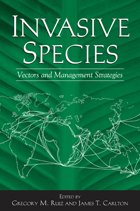
Recent years have seen a steep rise in invasions of non-native species in virtually all major ecoregions on Earth. Along with this rise has come a realization that a rigorous scientific understanding of why, how, when, and where species are transported is the necessary foundation for managing biological invasions.
Invasive Species presents extensive information and new analyses on mechanisms of species transfer, or vectors, as the latest contribution from the Global Invasive Species Programme (GISP). Contributors assess invasion vectors and vector management in terrestrial, freshwater, and marine ecosystems for major taxonomic groups in a variety of regions around the world. The book:
- examines invasion causes, routes, and vectors in space and time
- highlights current approaches and challenges to preventing new invasions, both from a geographic and taxonomic point of view
- explores strategies, benefits, and limitations of risk assessment
- offers a synthesis of many facets of vector science and management
- presents recommendations for action
Chapter authors review fungi, plants, invertebrates, and vertebrates, with geographic assessments covering New Zealand, Australia, South Africa, and the United States.
Although the full extent and cumulative impact of nonnative species can only be approximated, biological invasions are clearly a potent force of global change, contributing to a wide range of deleterious effects including disease outbreaks, habitat alteration and loss, declines of native species, increased frequency of fires, and shifts in nutrient cycling. Vectors are the delivery mechanisms, resulting in recent increases in rates of new invasions. Invasive Species brings together in a single volume new information from leading scientists around the world on approaches to controlling and managing invasion vectors. This volume is a timely and essential reference for scientists, researchers, policymakers, and anyone concerned with understanding biological invasions and developing effective responses to them.

READERS
Browse our collection.
PUBLISHERS
See BiblioVault's publisher services.
STUDENT SERVICES
Files for college accessibility offices.
UChicago Accessibility Resources
home | accessibility | search | about | contact us
BiblioVault ® 2001 - 2024
The University of Chicago Press









